|
|
|
Sort Order |
|
|
|
Items / Page
|
|
|
|
|
|
|
| Srl | Item |
| 1 |
ID:
096862
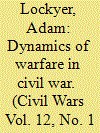

|
|
|
|
|
| Publication |
2010.
|
| Summary/Abstract |
This article explains theoretically, and demonstrates empirically, the instrumental role of the balance of capabilities in shaping the form of warfare that develops in civil wars. It contends that the current common practice of labelling civil wars as either 'guerrilla' or 'conventional' (which is usually meant to accurately characterise the type of warfare throughout an entire civil war) is unable to fully encapsulate the dynamic nature of warfare in civil war. It is instead argued that the form of warfare frequently varies significantly across time and space in a single conflict. This article is divided into three sections. Section one examines recent advances in the understanding of warfare in civil wars. It identifies three categories of warfare in civil war: conventional, guerrilla and irregular. Section two builds on previous studies to develop the concept of the balance of capabilities. Finally, the article illustrates these theoretical insights through a discussion of the American and Somali Civil Wars.
|
|
|
|
|
|
|
|
|
|
|
|
|
|
|
|
| 2 |
ID:
096863
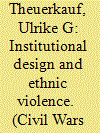

|
|
|
|
|
| Publication |
2010.
|
| Summary/Abstract |
Recent research on the motives of civil war has been dominated by the juxtaposition of greed versus grievance factors. This academic debate has generated a vast amount of empirical evidence to assess the explanatory power of the grievance concept but neglected its non-empirical limitations. In an attempt to direct attention back to the theoretical and methodological issues surrounding the grievance concept, the purpose of this analysis is twofold: first, I outline a grievance-based explanation of ethnic violence which argues that political institutions that provide low chances of political representation are likely to increase the odds of ethnic violence due to the intrinsic worth of political representation, its impact on the distribution of resources and powers, and its effects on perceptions of security. This explanation then serves, second, as a reference point to highlight three non-empirical limitations of the grievance concept, namely the lack of direct measures for grievances, the failure to identify clear reference categories of relative deprivation and the questionable assumption that all ethnic groups share common values. I conclude that due to these limitations, scholars working with the grievance concept inevitably remain in the realm of conjectures without being able to test the causal mechanisms they stipulate properly.
|
|
|
|
|
|
|
|
|
|
|
|
|
|
|
|
| 3 |
ID:
096859
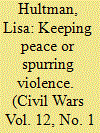

|
|
|
|
|
| Publication |
2010.
|
| Summary/Abstract |
Are peace operations effective in managing violence against civilians in civil wars? I examine the short-term effects of peace operations on the intensity of violence against the civilian population in internal conflicts. Missions are often sent to ongoing conflicts, where the warring parties have not yet managed to settle their dispute through the use of military means. I propose three mechanisms through which the presence of a third party may increase the parties' incentives to target civilians. A quantitative assessment of all intrastate armed conflicts, 1989-2006, shows that while the presence of a peace operation does not have a clear effect on government violence, it is associated with higher levels of violence by rebel groups. Only UN peace operations with an explicit mandate to protect civilians significantly reduce violence against civilians by rebels.
|
|
|
|
|
|
|
|
|
|
|
|
|
|
|
|
| 4 |
ID:
096860
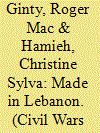

|
|
|
|
|
| Publication |
2010.
|
| Summary/Abstract |
Based on fieldwork and using two case studies from contemporary Lebanon, this article critically appraises indigenous responses to under-development and post-war reconstruction. Indigenous initiatives and methods have become popular among international organisations and international non-governmental organisations in development and reconstruction activities. There is a danger, however, in over-romanticising these approaches. While they hold advantages, they also hold potential risks, especially in the context of a deeply divided society. The article draws on the Waad initiative in Beirut's southern suburbs and the activities of the Future Movement in Tripoli to assess the usefulness of indigenous responses to reconstruction. After outlining the cases, four issues are discussed: the politicisation of indigenous assistance in deeply divided societies; the extent to which indigenous approaches to reconstruction can be participatory; the extent to which internationally-supported indigenous assistance can be usefully labelled as 'indigenous'; and the ability of non-state social actors to reinforce or undermine the state. Although drawing on Lebanese examples, it is hoped that the issues raised have relevance to other cases (especially in deeply divided societies) and connect with policy debates on the desirability of indigenous responses to reconstruction and development challenges.
|
|
|
|
|
|
|
|
|
|
|
|
|
|
|
|
| 5 |
ID:
096858


|
|
|
|
|
| Publication |
2010.
|
| Summary/Abstract |
Why are some peace processes accompanied by bloody political violence while others are not? Recent scholarship suggests that when factions fear that they will not benefit or will be excluded from a negotiated settlement these groups may protect their interests by sabotaging the peace process through violent tactics. We compare three peace processes in Africa - the negotiations to end armed struggles in Mali, the Western Sahara and Sudan - to investigate why spoilers arise in some contexts and not others. We argue that peace process exclusivity, that is negotiations between only some of the potential parties to a conflict, is more likely to breed violence than inclusive peace negotiations where all relevant groups have a seat at the bargaining table. A key to our argument is that the number and form of combatant groups is endogenous to peace process negotiations; as a result, exclusivity encompasses not just leaving out warring parties but also the exclusion of groups that might object to the terms of the peace should they be left out of the bargaining process. This is particularly important since many peace agreements include provisions regarding the distribution of government services, jobs, and representation that may indirectly impact the availability of those goods for other stakeholders, particularly non-combatant parties. While inclusive agreements may be harder to reach, our findings suggest that international organisations that participate in peace negotiations need to carefully consider the real-world trade-off between the ability to reach an agreement and the sustainability of that agreement over time.
|
|
|
|
|
|
|
|
|
|
|
|
|
|
|
|
| 6 |
ID:
096861
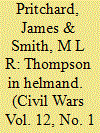

|
|
|
|
|
| Publication |
2010.
|
| Summary/Abstract |
British operations in Helmand province, Afghanistan, have been contextualised within the theory and practice of counter-insurgency. The theories of Sir Robert Thompson are held to represent the basis for successful counter-insurgency campaigning. This analysis takes the simple premise of posing the question as to whether British conduct in Helmand between 2006 and 2008 has represented the effective utilisation of Thompson's principles. Evaluating the evolution of British operations on the ground this analysis suggests that while the influence of Thompson's thinking can be clearly detected, in practice the implementation of his precepts have been undermined and negated by a variety of factors, most notably the weaknesses of the government of Afghanistan. The result has been an ever-greater focus on the prosecution of the military campaign to the exclusion of the multifaceted programme advocated by Thompson. In conclusion, it may be contended the campaign in Helmand does not resemble the ideals outlined by Thompson or, indeed, much of an effective counter-insurgency plan.
|
|
|
|
|
|
|
|
|
|
|
|
|
|
|
|
| 7 |
ID:
096864
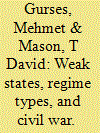

|
|
|
|
|
| Publication |
2010.
|
| Summary/Abstract |
A central theme in research on civil war and revolution is that 'weak states' are especially prone to civil war. Empirically, however, tests of this proposition have relied on proxy measures of state weakness such as GDP, mountainous terrain, and population, none of which directly measure features of the state itself. Earlier theoretical works point to particular regime types as being especially susceptible to civil war. We present a theoretical argument that delineates what regime types are more or less prone to civil war (and why) and test this theory with a series of logit models using Fearon and Laitin's and Sambanis' civil war data sets and Geddes' data classifying non-democratic regimes. The findings support earlier theoretical arguments that particular types of weak states - personalist or neopatrimonial regimes - are more prone to civil war onset than others.
|
|
|
|
|
|
|
|
|
|
|
|
|
|
|
|
|
|
|
|
|